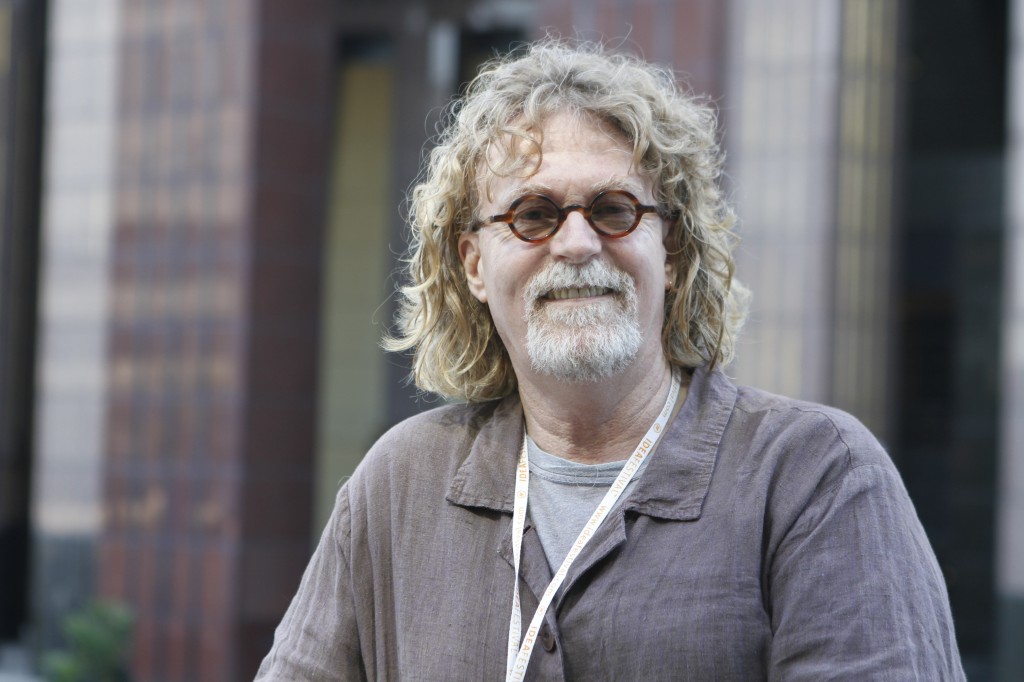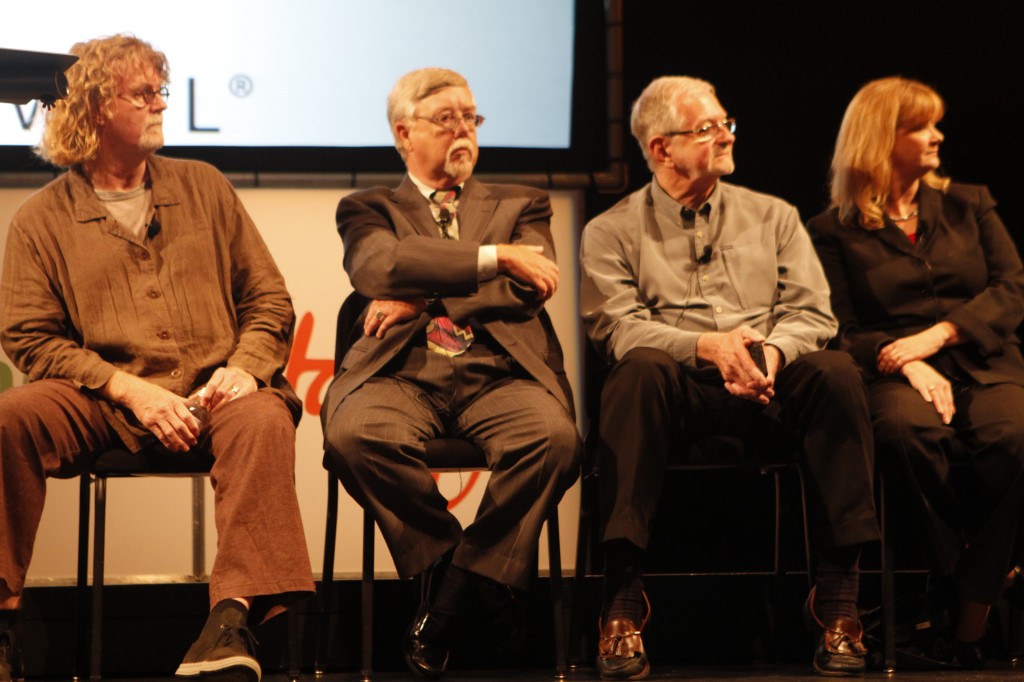 I had the opportunity to meet Curt L. Tofteland, the founder of a program called Shakespeare Behind Bars, in of all places, Louisville Kentucky in September.
I had the opportunity to meet Curt L. Tofteland, the founder of a program called Shakespeare Behind Bars, in of all places, Louisville Kentucky in September.
Created as early as 1991, he worked with Dr. Curtis Bergstrand, chair of the Sociology Department at Bellarmine University, to bring the works of William Shakespeare into Dr. Bergstrand’s Books Behind Bars program.
Yes, behind bars refers to prison. Starting in 1998, Shakespeare Behind Bars became an independent program within the programs housed at the Luther Luckett Correctional Complex.
Over the next 10 years, Tofteland produced and facilitated ten seasons of Shakespeare Behind Bars, which include touring to other correctional institutions, incorporating the Dept. of Juvenile Justice, and the award-winning documentary.
Shakespeare Behind Bars has continued to be funded by personal contributions from individuals. It is now a not-for-profit corporation independent of Kentucky Shakespeare Festival and its mission is to offer offer theatrical encounters with personal and social issues to the incarcerated, allowing them to develop life skills that will ensure their successful reintegration into society.
On the Idea Festival stage, Tofteland was joined by a former prisoners who were in the program: Larry Lucas and Richard Hughes, who couldn’t stop adding humor to his “shares.”
Also on stage was costume designer Michelle Bombe, retired warden at Luckett Steve Barry and Larry Chandler, who is the Chairman of the Kentucky Parole Board. Their work is inspiring and listening to the prisoners was particularly moving.
Shakespeare Behind Bars was founded on the beliefs that all human beings are inherently good, and that although convicted criminals have committed heinous crimes against other human beings, this inherent goodness still lives deep within them and must be called forth. Participation in the program can effectively change our world for the better by influencing one person at a time, awakening him or her to the power and the passion of the goodness that lives within all of us.
Shakespeare Behind Bars offers participants the ability to hope and the courage to act despite their fear and the odds against them. By immersing participants in the nine-month process of producing a Shakespeare play, Shakespeare Behind Bars uses the healing power of the arts, transforming inmate offenders from who they were when they committed their crimes, to who they are in the present moment, to who they wish to become.
 Why Shakespeare asked someone from the audience? Says Tofteland, “because there’s no one who understands the human condition like Shakespeare. I also like the pace and the language and the impact that it has on kids. It’s amazing but it has a similar impact on kids as it did with the prisoners.”
Why Shakespeare asked someone from the audience? Says Tofteland, “because there’s no one who understands the human condition like Shakespeare. I also like the pace and the language and the impact that it has on kids. It’s amazing but it has a similar impact on kids as it did with the prisoners.”
And added, “we have placed this lofty Shakespeare that is supposed to only be understood by the elite into prisons where prisoners involved feel a sense of pride and have to dig in deep to really understand what Shakespeare is trying to convey.”
Says Richard Hughes, “I also feel Shakespeare and his work works with rehabilitation. I can take some of that intellect and insight with me every day and it makes me feel proud. What’s new is old and what is old and is new.”
“There’s so much that happened in Shakespeare characters that happen today, so it makes me feel that if they got through it, I can get through it too. I don’t understand the mechanics but I just know that it works. Speaking words that end in a “th” makes me reflect and think about who I am and who I need to become. It makes me feel that I’m worth a damn. I wish all of you could go to prison to be a part of it. It’s amazing.”
The audience laughs.
Tofteland piped in with the best explanation and insight yet, “we could never have done Shakespeare behind bars without the support of others. Remember that it’s going into its 18th year.”
“It’s not about the inmates, it was about the trust between me and the inmates and now, between my successor and the inmates. Even though I currently live in Michigan, I know I’m always a guest in their house. It’s up to me to adapt to the world I’m presented with. I never allow the guys to talk about what it was like in the past. The prison has gone through six wardens and a couple of governors but I just adapt to these changes. You have to.”
“I come into a place of trust where men can talk about their deepest shame that is locked inside them. It’s a courageous and noble act. In creating a circle of trust, what happens in that circle, stays in the circle. In the circle, we’re all leaders and we’re all followers. This journey of self reflection that we all go on together is that we build deep trust with each other. I wanted to show everyone that not everyone in prison is a Charles Manson. Only 2% or so in prison are so mentally sick that they should never be let out. But people have to remember that 95% are going to leave prison at some point and the question is how do we want them to come out?”
Hughes ended up in the program by accident. He says that volunteered to be on the technical team for the “free t-shirt and pizza.” He reminds us that when you’re in prison, you start missing the most basic things about every day life like take out food and wearing clothes that look different from everyone else. He says that he gets bored easily never got bored with Shakespeare. As he started to reflect on his life and how he ended up in prison, he recalls one day staring at the concrete and the steel and thinking, “how on earth did I end up in here?”
How it works? Apparently they self cast and put in about 250 hours of rehearsal time to put on a performance and another 200 hours outside rehearsal. Their first performance is to the yard, then to their family and then to the public.
There’s a documentary out on Shakespeare Behind Bars and when Tofteland worked with the film crew, he had a rule: “Find out who the men are and not what they did.” He says, “Macbeth was a good guy who did something bad. When the guys start acting the character they’re playing, they start reflecting and examining their life. It’s never an excuse, only a reality. It gets them to think about how they got to prison and what were the things that led up to that point. It gets them to think and reflect: ‘what I am doing and who I am being in this present time is WHO I am, not who I will become.”
On why he did it and continued to do it for ten years? He says, “I see a miracle in this work every day and I’m addicted to miracles. I have a mantra that is: you don’t have to become what it is that you did.”
Hear hear Curt. It was a treasure to meet you and some of the men involved. Thanks for sharing so many insights about your work with the program and inspiring so many.
Photo credits: First shot upper left: The Tempest in 2002 directed by Curt Tofteland and the last theatre shot photo is of Winter’s Tail in 2010 directed by Matt Wallace. Shot on stage and photo of Curt Tofteland taken by Renee Blodgett. For more on the Idea Festival, see my visual/photo write-up.

Renee Blodgett is the founder of We Blog the World. The site combines the magic of an online culture and travel magazine with a global blog network and has contributors from every continent in the world. Having lived in 10 countries and explored nearly 80, she is an avid traveler, and a lover, observer and participant in cultural diversity.
She is also the CEO and founder of Magic Sauce Media, a new media services consultancy focused on viral marketing, social media, branding, events and PR. For over 20 years, she has helped companies from 12 countries get traction in the market. Known for her global and organic approach to product and corporate launches, Renee practices what she pitches and as an active user of social media, she helps clients navigate digital waters from around the world. Renee has been blogging for over 16 years and regularly writes on her personal blog Down the Avenue, Huffington Post, BlogHer, We Blog the World and other sites. She was ranked #12 Social Media Influencer by Forbes Magazine and is listed as a new media influencer and game changer on various sites and books on the new media revolution. In 2013, she was listed as the 6th most influential woman in social media by Forbes Magazine on a Top 20 List.
Her passion for art, storytelling and photography led to the launch of Magic Sauce Photography, which is a visual extension of her writing, the result of which has led to producing six photo books: Galapagos Islands, London, South Africa, Rome, Urbanization and Ecuador.
Renee is also the co-founder of Traveling Geeks, an initiative that brings entrepreneurs, thought leaders, bloggers, creators, curators and influencers to other countries to share and learn from peers, governments, corporations, and the general public in order to educate, share, evaluate, and promote innovative technologies.










